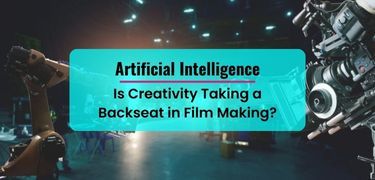Explore Cutting-Edge Research Papers at Seamedu
Cinema, the art of storytelling through visuals, has always been a realm where human creativity has thrived.


Introduction Script Generator AI
Cinema, the art of storytelling through visuals, has always been a realm where human creativity has thrived. Scriptwriting proves to be a demanding and time-intensive task, involving the need to shape a captivating narrative, construct intricate characters, and produce engaging dialogue. For generations, screenwriters have crafted compelling narratives, brought characters to life, and captured the essence of the human experience on film. However, in recent years, we've witnessed a growing trend in the use of AI-generated scripts in cinema, expanding the horizons of filmmaking and providing a technical approach to not only script writing but also other courses related to film making. While this technological advancement offers efficiency and innovation, it raises questions about the impact on human creativity and the authenticity of storytelling.
Artificial intelligence is advancing rapidly. In the coming years, we'll witness the emergence of new algorithms, neural networks, and deep learning techniques that can mimic human capabilities. AI script generator bots are set to revolutionise our interaction with technology, from generating news articles to predicting stock market trends. They're expected to enhance our productivity as well.
Surprisingly, AI generated scripts can now help overcome writer's block and even create movie scripts or narratives based on provided stories. Intrigued? We were too, which led us to research this topic before writing this article.
Green Signal to AI-Generated Scripts
Artificial intelligence has been making its presence felt in various industries, and cinema is no exception. AI-powered tools have been developed to assist filmmakers in generating scripts, dialogues, and even entire narratives. These script generator AI systems are trained on vast databases of existing films, scripts, and literature, enabling them to mimic human writing styles and storytelling techniques.
The Writers Guild of America suggests permitting AI to assist in scriptwriting without affecting writers' credits or residuals. This proposal aims to address concerns about job displacement while not imposing a complete ban on AI technology. Writers can collaborate with AI like ChatGPT without sharing credit or residuals, and studio executives can provide AI-generated scripts for writers to refine while still recognizing them as the initial writer on the project.
The proposal views AI as a tool, akin to Final Draft or a pencil, to aid writers without involving disputes over credits with software creators. However, it doesn't cover situations where AI independently writes a script.
The Writers Guild's proposal was discussed during the initial bargaining session with the Alliance of Motion Picture and Television Producers (AMPTP) on Monday. The AMPTP, representing the studios, hasn't indicated its stance on the proposal yet.
Mitchell Block, an Academy Award-winning executive producer, vividly remembers the moment he realised that artificial intelligence (AI) would revolutionise the world of filmmaking. This epiphany came shortly after he watched Morgan Neville's documentary, "Roadrunner," which focused on the life of the late Anthony Bourdain. Intriguingly, the film incorporated AI-generated dialogue spoken by the deceased celebrity. Block had no idea about this until Neville mentioned it in an interview, highlighting the transformative potential of AI in filmmaking.
He mentioned, “And that’s really the genius of AI — the idea that you can create something that doesn’t exist without necessarily having an army of artists and effects people to do all that hard work.”
Advantages of AI-Generated Scripts
- Efficiency: AI can churn out scripts at an unprecedented speed, saving time and resources in the pre-production phase.
- Data-Driven Insights: AI can analyse audience preferences, trends, and box office data to optimise scripts for commercial success.
- Creative Inspiration: AI can suggest novel ideas, plot twists, or character developments based on its analysis of successful films.
- Language Translation: AI can aid in script translation for global audiences, ensuring a broader reach for films.
- Accessibility: AI-generated scripts can make filmmaking more accessible to emerging talents and independent filmmakers with limited resources.
Limitations of AI scriptwriting Generator
While AI-generated scripts offer undeniable benefits, they also raise concerns about the erosion of human creativity in cinema. Here are some key limitations of AI scriptwriting:
- Homogenization of Content: AI often relies on existing formulas and successful tropes, potentially leading to a lack of originality and diversity in storytelling.
- Loss of Emotional Depth: Human screenwriters infuse their own emotions, experiences, and perspectives into their scripts, creating a deeper connection with the audience that AI may struggle to replicate.
- Artistic Intuition: AI lacks the intuitive, gut-feeling aspect of creativity that humans possess. It may not grasp the nuances of complex themes or abstract ideas.
- Oversaturation: The widespread use of AI-generated scripts could saturate the market with formulaic content, making it difficult for truly unique and innovative stories to stand out.
- Ethical Concerns: As AI learns from existing content, there's a risk of perpetuating stereotypes, biases, and harmful narratives present in older films.
How to balance AI with human input in scriptwriting?
Maintaining a balance in the utilisation of AI movie script generated tools is crucial to delving deeper into your human creativity and emotions. This is how you infuse your personal human experiences into your scripts. Here are a few strategies to strike that balance:
Collaborative Approach: Filmmakers can use AI as a tool to assist in script development rather than relying solely on it. AI script generators can help with data-driven decisions, leaving the creative aspects to human writers.
Innovation and Experimentation: AI can be used to explore new storytelling possibilities, encouraging filmmakers to push the boundaries of creativity.
Ethical Guidelines: Implement strict guidelines and review processes to ensure that AI-generated content aligns with ethical and societal values.
Mentorship and Education: Experienced screenwriters can mentor AI systems, passing on their creative insights and sensibilities to these machine. It is important to provide mentorship to the students of film institute making sure they can strike the balance between human creativity and script generated AI tools.
Conclusion
In conclusion, the evolution of cinema making in recent years has witnessed a significant shift towards the use of AI movie script generators, reflecting a broader trend in which technology is becoming increasingly integrated into creative processes. Moreover, the widespread use of AI scripts underscores the adaptability of the film industry in embracing technological innovations. Filmmakers have recognized the potential of AI to help them navigate the complexities of storytelling and audience engagement, allowing them to focus on other crucial aspects of production, such as cinematography, direction, and visual effects. This makes it crucial for film schools to introduce AI specialised courses in film making.
However, while AI generated scripts offer undeniable advantages, it is crucial to remember that they are tools rather than replacements for human creativity. The reliance on AI for scriptwriting raises questions about the authenticity and originality of cinematic narratives. Cinema has always thrived on the uniqueness of human storytelling, drawing from diverse experiences, emotions, and perspectives. Relying too heavily on AI script generators risks homogenising content and stifling the diversity of voices in the industry.
According to Olcun Tan, a visual effects supervisor originally from Germany and now residing in Los Angeles, “In robotics, in the 80s and 90s, the whole car industry got upset and Detroit was affected very negatively: the whole city turned into a ghost town. This is now happening with the middle class through AI.”
Ultimately, the choice between AI-based scripts and human-driven creativity in cinema making should be seen as a complementary rather than exclusive approach. The ideal future of the industry lies in finding a balance between the efficiency of AI and the richness of human imagination. By doing so, filmmakers can harness the power of technology while preserving the artistry, authenticity, and emotional depth that have made cinema a truly transformative medium throughout its history. Tan continues, “I feel we’re creating a world like the Greeks had. They would make pilgrimages and ask the Oracle. In these temples they would have places where you put your hand in and then you would ask for your future. We’re going in that direction because AI is getting so powerful.”
Join us for an exciting journey in Film Making at one of the best film making colleges in India Seamedu School of Pro-Expressionism for a three year degree in Film Making- ‘B.Sc. in Filmmaking’ and learn how to develop concepts, step by step, into workable stories and compelling screenplays.


CATEGORIES
- MBA Program
- Data Science and Analytics
- Cloud Computing
- Data Analytics and Business Intelligence
- AI and Digital Systems
- Cyber Security and Digital Forensics
- Business Analytics & Intelligence
- Banking & Financial Services
- International Business
- Digital Marketing
- Research Paper
- Media & Entertainment
- Media Management
- Journalism and Media Production
- Media & Information Technology
- Visual Communication
- Game Development
- Sound Engineering
- Game Art & Design
- Photography
- Film Making
- Animation & VFX
Are you aspiring to become a proficient Film Making professional?
Look no further; we are committed to nurturing the potential of young minds. Are you ready to enhance your skills?


